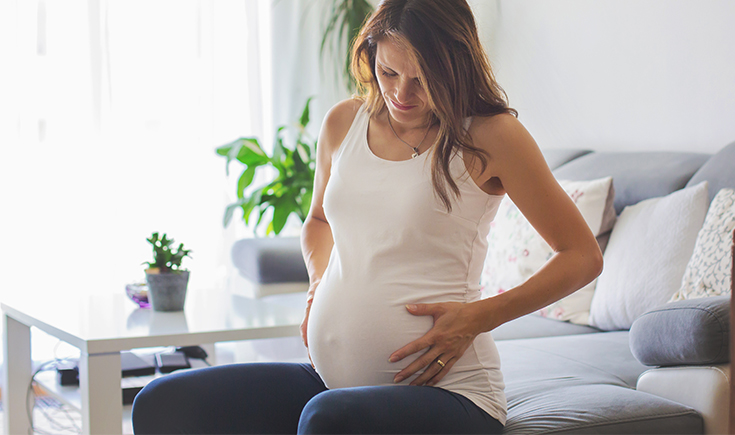

Pregnancy is amazing…except when it’s not. It’s a time of great change in your body, and sometimes those changes can cause discomfort, which can be concerning, particularly if it’s your first baby. You should mention anything that is worrying you to your obstetrician or midwife, but here are some of the common pregnancy discomforts you might expect at different stages throughout your pregnancy, as well as plenty of information about how to naviagate through them.
Common pregnancy discomforts
Each mumma-to-be may experience symptoms differently or not at all. The discomforts listed below are considered a normal (although, sometimes annoying!) part of pregnancy:
Morning sickness
It’s not clear what causes morning sickness, but it’s likely to be factors such as the increasing estrogen and progesterone levels, and an increased sense of smell and excess stomach acids.
Back pain
Most women will experience some form of back pain during pregnancy. It is caused by many factors such as the hormones your body releases (particularly in the final weeks as your body prepares for labour), a shifted centre of gravity, and normal pregnancy weight gain.
Bladder and bowel problems
During pregnancy, many women experience constipation, a need to urinate more frequently, incontinence, and haemorrhoids. Maintaining a health diet and doing regular exercise can help to make things less uncomfortable.
Changes to hair
Hormonal changes can affect your hair, making it thicker or thinner. You might also be wondering if it’s safe to dye your hair during pregnancy.
- Pregnancy beauty routine – what’s safe and what’s not?
- How to choose the right prenatal supplement for you
Changes to skin
As your pregnancy develops, you might find that you experience changes to your skin. You may develop dark patches on your face, your nipples and areola may become darker in colour, you may develop a dark line down the middle of your stomach, and you’ll also possibly find stretch marks and experience itching. Many women notice their skin becoming drier, more sensitive and itchier as it stretches and changes throughout the trimesters. It is important to care for skin during pregnancy and this can start in the first trimester and be continued through to after birth.
Fatigue
Feeling tired, faint, hotter than usual, and having difficulty sleeping are all quite common and due to hormonal changes, and later in your pregnancy it can be because of the extra weight you’re carrying. Ensure you get as much rest as possible—growing a baby is hard work!
Headaches
Headaches in pregnancy can often be triggered by a change in hormones, but also by dehydration, stress, poor posture, tiredness, or withdrawal from caffeine. However, unexplained, frequent headaches later in your pregnancy could be a sign of a more serious condition called pre-eclampsia, so please seek medical advice.
Indigestion and heartburn
Indigestion and heartburn is common, and can be painful and uncomfortable. If your symptoms are mild, it’s possible that changes to your diet and lifestyle may help to prevent them. If your heartburn doesn’t improve with lifestyle changes, or your symptoms are more severe, please speak to your doctor as it may be a sign of something more serious, such as pre-eclampsia.
Leg discomfort
Leg cramps, along with varicose veins, swelling, and restless legs syndrome are all a normal but sometimes uncomfortable part of pregnancy. Carrying extra weight, having a vitamin deficiency, hormonal changes, or being too active or not active enough may be contributors.
Vaginal discharge changes
Almost all women have vaginal discharge during pregnancy, which is normal and happens for a few reasons. The cervix and vaginal walls get softer and discharge increases to help prevent any infections traveling up to the womb from the vagina. Towards the end of pregnancy, the amount of discharge increases and can be confused with urine. Tell your doctor or midwife if your discharge changes in any way.
Vaginal thrush
Most women experience occasional bouts of the common yeast infection known as vaginal thrush. You’re more at risk of it while pregnant due to the changes in hormones. If you have it, you should always seek advice from your medical provider rather than buying anti-thrush medication over the counter from a pharmacy.
Pregnancy, Birth, & Baby, Common discomforts during pregnancy, last reviewed 2018.























